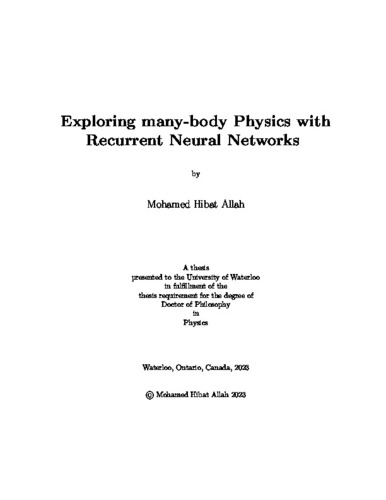| dc.contributor.author | Hibat Allah, Mohamed | |
| dc.date.accessioned | 2023-06-22 19:44:20 (GMT) | |
| dc.date.available | 2023-06-22 19:44:20 (GMT) | |
| dc.date.issued | 2023-06-22 | |
| dc.date.submitted | 2023-06-22 | |
| dc.identifier.uri | http://hdl.handle.net/10012/19581 | |
| dc.description.abstract | Originally developed within the natural language processing community, Recurrent neural networks (RNNs) have enabled remarkable progress in speech recognition and machine translation. These architectures belong to the class of autoregressive generative models which allow for exact likelihood estimation and for a perfect sampling of multi-modal complex probability distributions. These desirable features suggest that RNNs may serve as ansatzes wave functions in the context of Variational Monte Carlo (VMC), where ansatzes based on a Markov chain Monte Carlo sampling scheme can be limited by long autocorrelation time. The main vision developed here replaces words with physical degrees of freedom as inputs to the RNN in order to transfer this technology to the context of many-body physics. In this thesis, we develop RNN wave functions in multiple spatial dimensions and with different flavors and symmetry considerations that can suit the need for different variational calculations. We demonstrate the power of RNN wave functions on various prototypical systems in one, two, and three spatial dimensions. We show that our ansatz can compete and outperform state-of-the-art methods such as Density Matrix Renormalization Group (DMRG). We also illustrate how to estimate observables, and entanglement, with which we can study different phases of matter including conventional and topologically ordered states, as well as phase transitions among different phases. We also develop a scheme for simulating a variational version of classical and quantum annealing for the purpose of solving combinatorial optimization problems. We demonstrate that our scheme, tested on various RNNs architectures, shows superior average performances compared to Markov-chain Monte Carlo implementation of classical annealing and quantum annealing on prototypical and real-world combinatorial optimization problems. We also highlight the importance of the annealing scheme in overcoming local minima in a traditional VMC optimization, especially in frustrated systems. We conclude this thesis with examples of exact constructions of traditional probability distributions based on RNNs as a first step toward understanding the promising performances of these architectures. In addition to tensor network and Monte Carlo methods, we believe that RNNs are a valuable toolbox for physicists to help address open questions in classical and quantum many-body physics. | en |
| dc.language.iso | en | en |
| dc.publisher | University of Waterloo | en |
| dc.subject | Recurrent Neural Networks | en |
| dc.subject | Many-body Physics | en |
| dc.subject | Variational Monte Carlo | en |
| dc.subject | Quantum physics | en |
| dc.subject | Combinatorial optimization | en |
| dc.subject | Topological order | en |
| dc.subject | Classical and Quantum annealing | en |
| dc.subject | Natural language processing | en |
| dc.subject | Machine Learning | en |
| dc.title | Exploring many-body Physics with Recurrent Neural Networks | en |
| dc.type | Doctoral Thesis | en |
| dc.pending | false | |
| uws-etd.degree.department | Physics and Astronomy | en |
| uws-etd.degree.discipline | Physics | en |
| uws-etd.degree.grantor | University of Waterloo | en |
| uws-etd.degree | Doctor of Philosophy | en |
| uws-etd.embargo.terms | 0 | en |
| uws.contributor.advisor | Carrasquilla, Juan | |
| uws.contributor.advisor | Melko, Roger | |
| uws.contributor.affiliation1 | Faculty of Science | en |
| uws.published.city | Waterloo | en |
| uws.published.country | Canada | en |
| uws.published.province | Ontario | en |
| uws.typeOfResource | Text | en |
| uws.peerReviewStatus | Unreviewed | en |
| uws.scholarLevel | Graduate | en |

